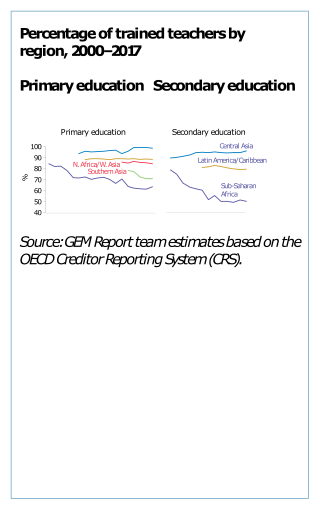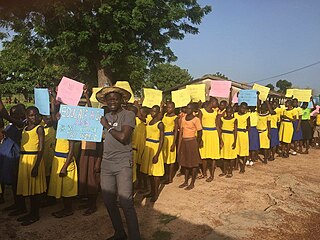
John Caldwell Holt was an American author and educator, a proponent of homeschooling, and a pioneer in youth rights theory.

Pedagogy, from Ancient Greek παιδαγωγία (paidagōgía), most commonly understood as the approach to teaching, is the theory and practice of learning, and how this process influences, and is influenced by, the social, political and psychological development of learners. Pedagogy, taken as an academic discipline, is the study of how knowledge and skills are imparted in an educational context, and it considers the interactions that take place during learning. Both the theory and practice of pedagogy vary greatly as they reflect different social, political, and cultural contexts.
Critical pedagogy is a philosophy of education and social movement that developed and applied concepts from critical theory and related traditions to the field of education and the study of culture.
Critical literacy is the ability to find embedded discrimination in media. This is done by analyzing the messages promoting prejudiced power relationships found naturally in media and written material that go unnoticed otherwise by reading beyond the author's words and examining the manner in which the author has conveyed his or her ideas about society's norms to determine whether these ideas contain racial or gender inequality.

Student voice is the individual and collective perspective and actions of students within the context of learning and education. It is identified in schools as both a metaphorical practice and as a pragmatic concern. Tech educator Dennis Harper noted that student voice gives students "the ability to influence learning to include policies, programs, contexts and principles."

Teacher education or teacher training refers to programs, policies, procedures, and provision designed to equip (prospective) teachers with the knowledge, attitudes, behaviors, approaches, methodologies and skills they require to perform their tasks effectively in the classroom, school, and wider community. The professionals who engage in training the prospective teachers are called teacher educators.
This glossary of education-related terms is based on how they commonly are used in Wikipedia articles. This article contains terms starting with A – C. Select a letter from the table of contents to find terms on other articles.

Inclusion in education refers to all students being able to access and gain equal opportunities to education and learning. It arose in the context of special education with an individualized education program or 504 plan, and is built on the notion that it is more effective for students with special needs to have the said mixed experience for them to be more successful in social interactions leading to further success in life. The philosophy behind the implementation of the inclusion model does not prioritize, but still provides for the utilization of special classrooms and special schools for the education of students with disabilities. Inclusive education models are brought into force by educational administrators with the intention of moving away from seclusion models of special education to the fullest extent practical, the idea being that it is to the social benefit of general education students and special education students alike, with the more able students serving as peer models and those less able serving as motivation for general education students to learn empathy.
English-Language Learner is a term used in some English-speaking countries such as the United States and Canada to describe a person who is learning the English language and has a native language that is not English. Some educational advocates, especially in the United States, classify these students as non-native English speakers or emergent bilinguals. Various other terms are also used to refer to students who are not proficient in English, such as English as a Second Language (ESL), English as an Additional Language (EAL), limited English proficient (LEP), Culturally and Linguistically Diverse (CLD), non-native English speaker, bilingual students, heritage language, emergent bilingual, and language-minority students. The legal term that is used in federal legislation is 'limited English proficient'. The instruction and assessment of students, their cultural background, and the attitudes of classroom teachers towards ELLs have all been found to be factors in the achievement of these students. Several methods have been suggested to effectively teach ELLs, including integrating their home cultures into the classroom, involving them in language-appropriate content-area instruction early on, and integrating literature into their learning programs.
Anti-oppressive education encompasses multiple approaches to learning that actively challenge forms of oppression.
Direct instruction (DI) is the explicit teaching of a skill set using lectures or demonstrations of the material to students. A particular subset, denoted by capitalization as Direct Instruction, refers to the approach developed by Siegfried Engelmann and Wesley C. Becker that was first implemented in the 1960s. DI teaches by explicit instruction, in contrast to exploratory models such as inquiry-based learning. DI includes tutorials, participatory laboratory classes, discussions, recitation, seminars, workshops, observation, active learning, practicum, or internships. Model includes "I do" (instructor), "We do", "You do".
Education sciences, also known as education studies, education theory, and traditionally called pedagogy, seek to describe, understand, and prescribe education policy and practice. Education sciences include many topics, such as pedagogy, andragogy, curriculum, learning, and education policy, organization and leadership. Educational thought is informed by many disciplines, such as history, philosophy, sociology, and psychology.
Multicultural education is a set of educational strategies developed to provide students with knowledge about the histories, cultures, and contributions of diverse groups. It draws on insights from multiple fields, including ethnic studies and women studies, and reinterprets content from related academic disciplines. It is a way of teaching that promotes the principles of inclusion, diversity, democracy, skill acquisition, inquiry, critical thought, multiple perspectives, and self-reflection. One study found these strategies to be effective in promoting educational achievements among immigrant students.
The Rouge Forum is an organization of educational activists, which focuses on issues of equality, democracy, and social justice.

Indigenous education specifically focuses on teaching Indigenous knowledge, models, methods, and content within formal or non-formal educational systems. The growing recognition and use of Indigenous education methods can be a response to the erosion and loss of Indigenous knowledge through the processes of colonialism, globalization, and modernity.

Teaching Channel is a multi-platform service founded in 2010 delivering professional development videos for teachers over the Internet. In addition to showcasing inspiring teachers in videos, Teaching Channel also hosts a community for educators to share ideas, best practices and enhance their knowledge.
Feminist pedagogy is a pedagogical framework grounded in feminist theory. It embraces a set of epistemological theories, teaching strategies, approaches to content, classroom practices, and teacher-student relationships. Feminist pedagogy, along with other kinds of progressive and critical pedagogy, considers knowledge to be socially constructed.

The term learning environment can refer to an educational approach, cultural context, or physical setting in which teaching and learning occur. The term is commonly used as a more definitive alternative to "classroom", but it typically refers to the context of educational philosophy or knowledge experienced by the student and may also encompass a variety of learning cultures—its presiding ethos and characteristics, how individuals interact, governing structures, and philosophy. In a societal sense, learning environment may refer to the culture of the population it serves and of their location. Learning environments are highly diverse in use, learning styles, organization, and educational institution. The culture and context of a place or organization includes such factors as a way of thinking, behaving, or working, also known as organizational culture. For a learning environment such as an educational institution, it also includes such factors as operational characteristics of the instructors, instructional group, or institution; the philosophy or knowledge experienced by the student and may also encompass a variety of learning cultures—its presiding ethos and characteristics, how individuals interact, governing structures, and philosophy in learning styles and pedagogies used; and the societal culture of where the learning is occurring. Although physical environments do not determine educational activities, there is evidence of a relationship between school settings and the activities that take place there.
Critical mathematics pedagogy is an approach to mathematics education that includes a practical and philosophical commitment to liberation. Approaches that involve critical mathematics pedagogy give special attention to the social, political, cultural and economic contexts of oppression, as they can be understood through mathematics. They also analyze the role that mathematics plays in producing and maintaining potentially oppressive social, political, cultural or economic structures. Finally, critical mathematics pedagogy demands that critique is connected to action promoting more just and equitable social, political or economic reform.
Abolitionist teaching, also known as abolitionist pedagogy, is a set of practices and approaches to teaching that focus on restoring humanity and pursuing educational freedom for all children in schools. It is rooted in Black critical theory. The term was coined by author and professor Bettina Love.